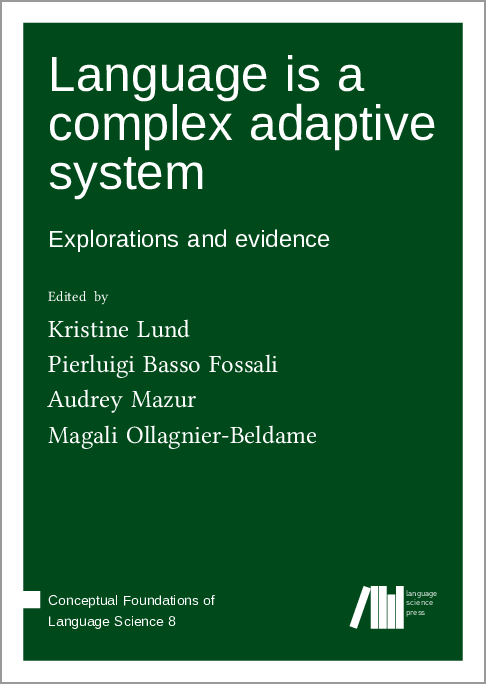We log anonymous usage statistics. Please read the privacy information for details.
Language is a complex adaptive system: Explorations and evidence
Synopsis
The ASLAN labex - Advanced studies on language complexity - brings together a unique set of expertise and varied points of view on language. In this volume, we employ three main sections showcasing diverse empirical work to illustrate how language within human interaction is a complex and adaptive system. The first section – epistemological views on complexity – pleads for epistemological plurality, an end to dichotomies, and proposes different ways to connect and translate between frameworks. The second section – complexity, pragmatics and discourse – focuses on discourse practices at different levels of description. Other semiotic systems, in addition to language are mobilized, but also interlocutors’ perception, memory and understanding of culture. The third section – complexity, interaction, and multimodality – employs different disciplinary frameworks to weave between micro, meso, and macro levels of analyses. Our specific contributions include adding elements to and extending the field of application of the models proposed by others through new examples of emergence, interplay of heterogeneous elements, intrinsic diversity, feedback, novelty, self-organization, adaptation, multi-dimensionality, indeterminism, and collective control with distributed emergence. Finally, we argue for a change in vantage point regarding the search for linguistic universals.
Chapters
-
Introduction to language as a complex adaptive system
-
Introduction to epistemological views on complexity
-
Semiotic mediations and complexity managementParadoxes and regulative principles
-
What knowledge owes to experience: Complexity and first-person epistemology
-
Modelling the co-elaboration of knowledgeConnecting cognitive, linguistic, social and interactional systems
-
Introduction to complexity, pragmatics and discourse
-
Proposal for a simplex account of discourse complexity using the pragma-enunciative theory of points of view
-
The morphogenesis of language actionComplexity and rhythmic synchronisation of enunciation
-
Dialogism for daily interaction
-
Modalities in written chat interactionsA complex system
-
Introduction to complexity, interaction and multimodality
-
Collective reasoning as the alignment of self-identity footings
-
Multimodal conversational routinesTalk-in-interaction through the prism of complexity
-
Multimodal practice of participation in a complex and dynamic framework
-
Second language use and development in an immersion class considered as a complex adaptive process
-
Considering the complex adaptive system from multiple vantage points




